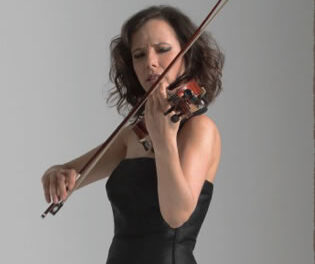On Independence Day, who can pass up a chance to hear musical fireworks and see the real thing at the same venue? Under the baton of Wesley Schulz, and aided by the translucent lyric soprano of Lindsay Kesselman, the North Carolina Symphony presented a variety of Americana and patriotic offerings followed by a spectacular fireworks display. Despite a thunder delay earlier in the evening, the field at Booth Amphitheatre was thronged with enthusiastic (albeit damp) families with picnic baskets at the ready.
This free concert is always quite informal, which leads to some differing expectations regarding appropriate behavior. Some chatty folks were merely passing time until the fireworks, while others were visibly annoyed at the hubbub drowning out the orchestra. That said, the children present certainly enjoyed both, and anytime young people are comfortable and content while hearing an orchestral concert, we should all count it as a win.
Maestro Schulz got things off to a rollicking start with Gould’s American Salute, a medley of familiar folk tunes, most prominently featuring “When Johnny Comes Marching Home.” This medley was followed by three songs arranged by Aaron Copland, “The Dodger Song,” “Simple Gifts,” and “I Bought Me a Cat,” sung by Kesselman. This singer boasts impeccable diction, and her style and tone were exactly calculated to please a pops audience. She approached the Copland arrangements playfully and warmly, avoiding any hint of heavy-handedness in timbre or vibrato.
In keeping with current fashion, this pops concert included a couple of warhorses from “legit” orchestral repertoire: Verdi’s “Triumphal March” from Aida and Tchaikovsky’s1812 Overture. For some of the picnicking audience, the Verdi went over a bit like a pill hidden in applesauce. Onstage was a different matter; the musicians were much more focused and Maestro Schulz was much more animated, compared to the pops tunes. The performance was brilliant and polished but unfortunately underappreciated by the audience. The Year 1812 Solemn Overture, Festival Overture in E-flat, Op. 49, as it is formally titled, suffered from the acoustics of the outdoor performance space. While anything with cannons in the instrumentation should theoretically fit right into an outdoor patriotic concert, the overture was not written to be performed outside, and many of the delicate moments at the beginning were overwhelmed by the noisy audience – however, they were equally noisy in their applause.
Other pops selections included Morton Gould’s arrangement of “Yankee Doodle,” Victor Herbert’s “American Fantasy,” and arrangements “Servicemen on Parade” and “Pops Hoedown” by Richard Hayman, longtime arranger for the Boston Pops. “Servicemen on Parade” (which, interestingly does not follow the Department of Defense guidelines for the order of the service songs: Army, Marine Corps, Navy, Air Force, and Coast Guard) provided a welcome reminder of the true meaning of the holiday when members of the armed forces stood to be honored as their service song was played. “Pops Hoedown” provided an excellent opportunity to display the talents of the string section, which were generally playing a supporting role with a lot of the loudly celebratory focus on the brass, woodwind, and percussion sections.
Kesselman joined the orchestra again for two more numbers after intermission: a beautiful arrangement of the Gershwin tunes “Someone to Watch Over Me” and “Embraceable You” and Berlin’s “God Bless America.” The latter piece was pitched a bit lower than ideal for Kesselman’s tessitura, but she managed gracefully. “God Bless America” also included the spoken text of Emma Lazarus’ famous poem, The New Colossus, which was precisely timed with underscoring by Schulz.
Other instrumental offerings during the second half included John Williams’ “Liberty Fanfare” and three Sousa marches, in addition to the aforementioned 1812 Overture. The Sousa marches, “Semper Fidelis,” “Washington Post,” and “Stars and Stripes Forever,” provided the highlight of the program. Featuring instrumentation that was specifically designed to be heard by large crowds outdoors, the three marches were given a balanced, effective, and rousing performance, pleasing both wine-and-cheese and beer-and-hot-dog-picnickers. It would have been interesting to hear a few of Sousa’s more obscure marches instead of these old favorites – perhaps next year.
Amplification (no sound designer was credited on the website, which is a shame) was tasteful and beautifully balanced, with no feedback, no glaringly obvious adjustments in levels, and no irritating thumps from players bumping into microphones. The volume was somewhat low at the back of the field – given how talkative the audience was – but less is more in orchestral settings when it comes to sound design.
If you were scared off by the threatening thunderheads, there are plenty more opportunities to catch the NC Symphony outside this summer. For more details on the Summerfest series, please check out our calendar!











